

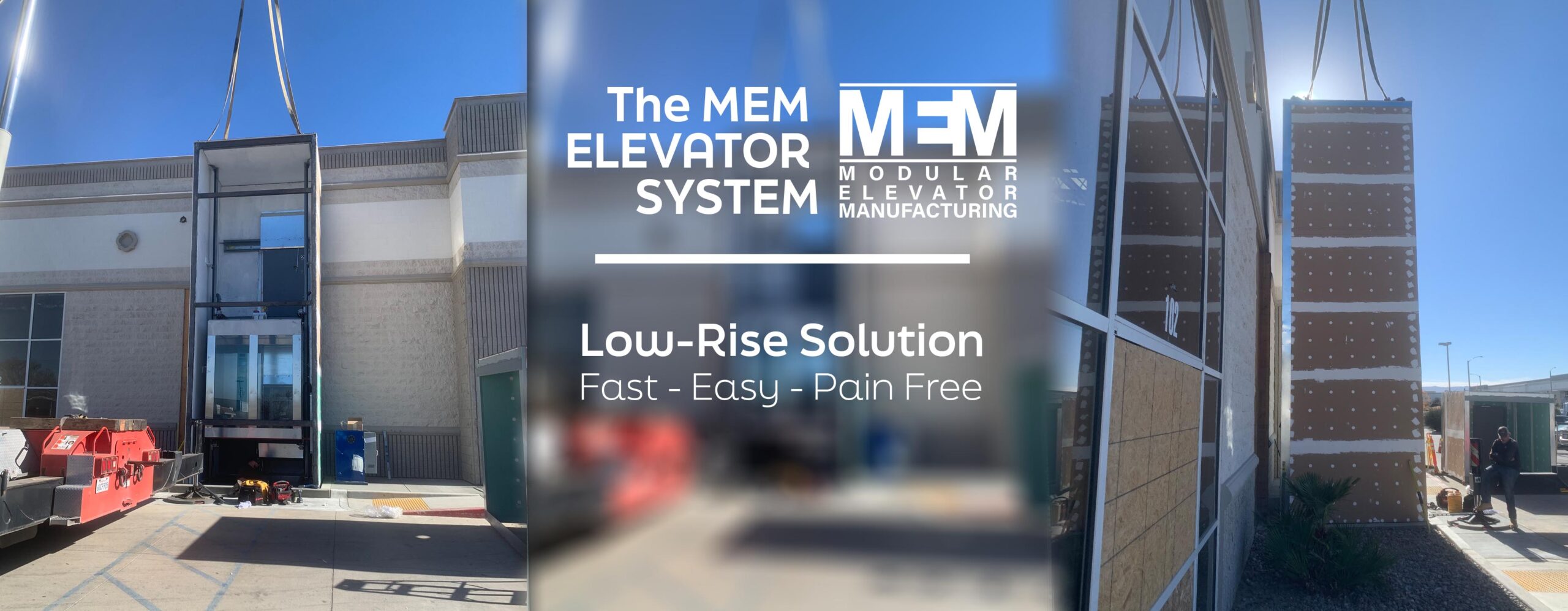
MEM System is Fast – Easy – Pain Free. If you’re planning a low-rise building project—whether it’s new construction or a retrofit—adding an elevator doesn’t have to be a complicated or drawn-out process. In fact, with a modular elevator system, it can be one of the easiest parts of your project.
Here’s why more builders, architects, and developers are turning to low-rise modular elevators as a fast, streamlined, and stress-free solution.
Traditional elevators can take months to install, slowing down the entire project timeline. But modular elevators? They’re factory-assembled, pre-wired, and shipped to the site as a fully integrated unit—hoistway, elevator cab, and mechanicals included.
Once delivered, these elevators are placed in just a couple hours, with final startup shortly after. That’s a massive time-saver and means you can keep your project moving without the usual elevator-related delays.
Whether you’re working on new construction or a retrofit, modular elevators can be seamlessly integrated. For retrofits especially, they’re a game changer: you don’t have to tear apart the building or drastically reconfigure floor plans.
Modular elevators can be installed on the exterior or interior of a structure and are adaptable to a variety of architectural styles and building types—from schools and offices to healthcare facilities and multi-family units.
Coordinating multiple trades for a conventional elevator install—mud and tape crews, elevator techs, steel workers, etc.—can be a headache. With modular elevators, the work is done in a controlled factory environment, minimizing the number of trades needed onsite and reducing the risk of delays or miscommunication.
That means fewer moving parts, fewer surprises, and a smoother overall process.
Just because it’s modular doesn’t mean it cuts corners. Low-rise modular elevators meet the same building codes, safety standards, and ADA requirements as traditional systems. They’re also built with high-quality materials and undergo rigorous quality control checks before leaving the factory.
So you’re not sacrificing reliability or safety for speed—you’re just getting to the finish line faster.
Time is money on a job site. By cutting weeks or months from your schedule and reducing onsite labor, modular elevators can lower overall project costs.
Plus, because the MEM Elevator System is pre-engineered and pre-built, your costs are more predictable—fewer change orders, fewer delays, and fewer headaches.
They are also DSA approved in California and can be simply inserted into plans for schools or other qualifying projects.
Adding an elevator doesn’t have to be a complex ordeal. A low-rise modular elevator delivers the speed, ease, and dependability your project needs.

If you’re looking for a smarter way to elevate your next project, modular is the way to go.
If you want to discover more about the MEM Elevator System and all the benefits, just click one of the links below. We are ready to share drawings, discuss your project and start working with you.

Rebuilding Home Elevator Solution – With the devastating fires throughout Southern California many will be rebuilding their forever home. If you are an architect, general contractor or owner we are ready to help you with our home elevator solution.
Let’s face it if you are building or designing a replacement forever home that is multi-story, you need a residential elevator. We have all had that thought, “This is the last place I am going to live in.” The second you say that, or your client says that, you should immediately start thinking about a residential elevator. It makes sense even if you didn’t have one before.
Whether it is vertical transportation from a garage to the main floor or have multiple floors above grade an elevator is a must. After all, we are not getting any younger! But, additionally an elevator helps when carrying laundry or other items up and down stairs. An elevator is essential for the forever home. So, if you are seriously thinking about an elevator for a new home or even an existing home, what’s your next step? Contact Los Angeles based TLS Shield & Associates. We are are elevator experts and the home for residential elevators.
TL Shield and Associates has the most experience in the industry with true professionals to guide your project every step of the way so you don’t have to deal with the headaches and hassles. Whether you are a home owner, architect or general contractor we meet your needs and expectations. TL Shield is simply the a top choice for purchasing residential elevators.
These qualities, combined with our reputation and expertise, make us a strong contender for those seeking a reliable and high-quality residential elevator.

If you are rebuilding we are your home elevator solution. Or considering new construction with multiple floors and have not had a home elevator before, now is the time to consider including one in your plans. If you are planning your forever, dream home, vertical transportation should be a priority. We provide all the assistance you will need to get exactly what you want.
We make it easy to find out more! All you need to do is click the button below and schedule a professional consultation and analysis of your project. You will see why we are the residential elevator home.
We will be more than happy to provide you with a thumbnail number. Then you are on your way to having a great elevator in your new home or addition.
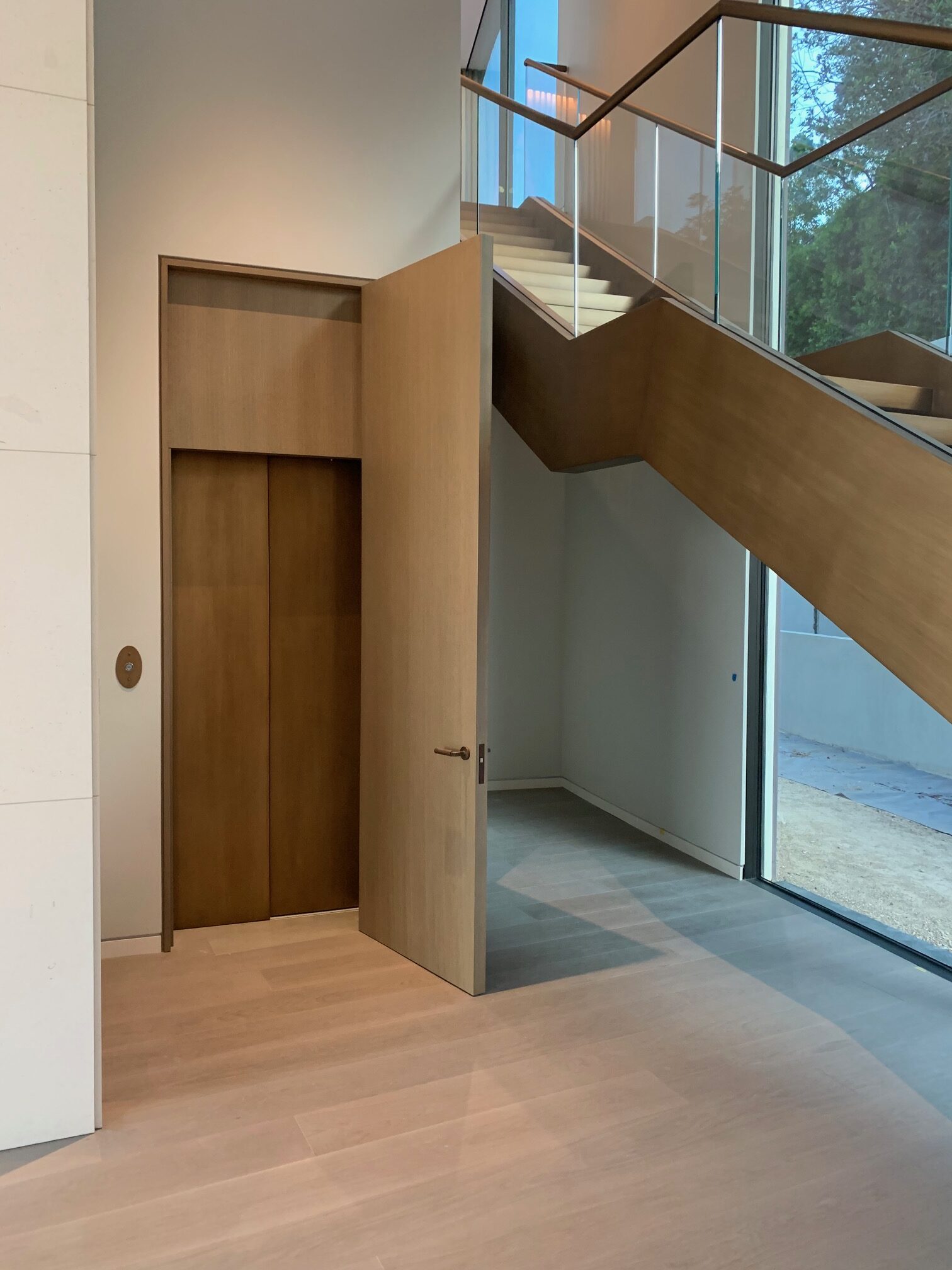
If you are building a new forever home that is multi-story, you need a residential elevator. We have all had that thought, “This is the last home I am going to live in.” The second you say that to yourself you should immediately start thinking about a residential elevator.
Whether you are needing vertical transportation from a garage to the main floor or have multiple floors above grade an elevator is a must. After all, we are not getting any younger! But, additionally an elevator helps when carrying laundry or other items up and down stairs. An elevator is essential for the forever home. So, if you are seriously thinking about an elevator for a new home or even an existing home, what’s your next step? Contact Los Angeles based TLS Shield & Associates. They are elevator experts and the home for residential elevators.
TL Shield and Associates has the most experience in the industry with true professionals to guide your project every step of the way so you don’t have to deal with the headaches and hassles. Whether you are a home owner, architect or general contractor we meet your needs and expectations. TL Shield is simply the a top choice for purchasing residential elevators.
These qualities, combined with our reputation and expertise, make us a strong contender for those seeking a reliable and high-quality residential elevator.


If you are considering new construction with multiple floors and have not had a home elevator before, now is the time to consider including one in your plans. If you are planning your forever, dream home, vertical transportation should be a priority. We provide all the assistance you will need to get exactly what you want.
We make it easy to find out more! All you need to do is click the button below and schedule a professional consultation and analysis of your project. You will see why we are the residential elevator home.
We will be more than happy to provide you with a thumbnail number. Then you are on your way to having a great elevator in your new home or addition.

TL Shield and Associates Gains HDC Approval – Los Angeles, CA. Modular Elevator Manufacturing has now gained official approval for models of their MEM Elevator System in the state of California. The MEM Elevator System is a complete commercial quality elevator. It is a hoistway or shaft produced in a factory out of tough 4X4 inch steel, wrapped in drywall. Inside it contains all the elevator components pre-installed in the manufacturing facility. This includes the doors, wiring, the elevator cab, and all the buttons or hall calls. It arrives on a truck and put in place in a matter of a couple hours. When given power it is started up in less than a week.
The California Department of Housing and Community Development gave its approval for the MEM Elevator System HW2 – 3500 product earlier this month and it will be a game changer for the elevator and construction industry. The California HCD is the state agency responsible for overseeing the planning, development, and preservation of affordable housing, as well as managing various housing-related programs and policies in California. The HCD works on initiatives to provide safe, affordable housing for residents, promote sustainable community development, and address homelessness. They also support local governments with housing policy, zoning regulations, and funding for housing projects.
This is a game changer for TL Shield and Modular Elevator Manufacturing (MEM) to be approved by the HCD. It ensures that the elevators meet strict safety, building, and accessibility codes required by the state. This approval ensures that the elevators are compliant with California’s standards, particularly for modular homes and structures that often need specialized installations. Also, this speeds up the approval process by weeks if not months, significantly closing the time from concept to installation.
Here are a few key reasons why approval from HCD is so important:
This breakthrough in approval means that the MEM Elevator System structure no longer has to go through the local jurisdictional inspection process. In short, the approval by HCD is necessary for ensuring that MEM elevators are safe, compliant, and ready for use in California’s modular construction projects.
Although this is great news for TL Shield there are some restrictions that need to be explained. The designation is not on all MEM products. It is for only the HW2 – 3500. This is the best selling commercial modular elevator in California. But depending on your project it may have to go through the normal approval process.
The designation is also only for modular housing projects in California. Although, MEM distributes nationwide to a wide variety of vertical markets including, apartment complexes, commercial structures, school, colleges and universities, stadiums, hotels, medical facilities, and other types of industries, the HCD designation does not apply.
The building tie-ins are not a part of the HCD approval and must still undergo approval by the proper authorities.
It is however to good to know that the HCD has recognized the MEM Elevator System.
Finally, the construction industry will have an approved alternative to traditional elevators that slow the construction process. There is no more waiting on the elevator for projects that can use the HCD designation. As a result on these projects the elevator company will no longer get in the way and control the jobsite.

On a side note, the HCD designation is important for other reasons. It shows that the Modular Elevator Manufacturing process and approved products are of the highest quality. Also, they can meet stringent approval processes in most any jurisdiction. Even some that were thought to have been off limits in the past.
So, whether you are in California or any other state in the union you can be confident that the modular elevator you are purchasing is high-quality. They are even a high enough quality for approval in earthquake prone California.
If you would like more information regarding the MEM Elevator System for use in one of your projects please click the button below to request a Fast Track Quote. Also, you can request a factory tour to get a better perspective on the revolutionary MEM Elevator System. a pitch and make it clear. Give the reader a reason to click. Also leave anything below this alone. It is code and stays the same.

Your residential elevator home. When looking to build new or to add on to an existing property. It is important to remember that Los Angeles based TLS Shield & Associates is your home for residential elevators.
TL Shield and Associates has the most experience in the industry with true professionals to guide your project every step of the way so you don’t have to deal with the headaches and hassles. Whether you are a home owner, architect or general contractor we meet your needs and expectations. TL Shield is simply the a top choice for purchasing residential elevators.
These qualities, combined with our reputation and expertise, make us a strong contender for those seeking a reliable and high-quality residential elevator.

If you are considering new construction with multiple floors and have not had a home elevator before, now is the time to consider including one in your plans. If you are planning your forever, dream home, vertical transportation should be a priority. We provide all the assistance you will need to get exactly what you want.
We make it easy to find out more! All you need to do is click the button below and schedule a professional consultation and analysis of your project. You will see why we are the residential elevator home.
We will be more than happy to provide you with a thumbnail number. Then you are on your way to having a great elevator in your new home or addition.

Non-proprietary parts matter. However, often times non-proprietary parts are over looked, not considered or just not understood. So, let’s start from the beginning. What’s the definition of non-proprietary elevator parts and how can they solve problems regarding your elevator choice.

Generally, proprietary elevator parts are components produced, marketed and controlled under exclusive legal rights of the manufacturer. The manufacturer has no obligation to share any information about the part or component, how it functions, how it operates, how it can be repaired or used to adjust or improve the overall functioning of an elevator unless it is contractually obligated to do so.
Non-proprietary on the other hand, means there are no restrictions to the use or what company can repair or improve the functionality of the elevator.
Well that was a mouthful. The definition can be reduced to a more simple, proprietary elevator parts are ones that only the manufacturer can repair or use in a repair or maintenance of an elevator. Non-proprietary opens the door to any qualified and licensed elevator professional.
An even more concise characterization is, proprietary bad; non-proprietary good.
But why? Why are proprietary parts to be avoided when looking at elevator purchases.
There are limited arguments against choosing an elevator that has non-proprietary parts over proprietary. When non-proprietary options were first available, there was a short time that they were considered inferior due to their recent emergence.
That thinking is no longer a concern. There is a decades long track record now that shows reliability and durability for non-proprietary components. Keep in mind that all elevator components and elevator operations are subject to elevator codes, inspections, and parts must pass rigorous testing before they would ever be allowed in an elevator.
Also, much of the functionality that proprietary elevators could boast of is now available with non-proprietary units.
Too many times we receive calls from individuals that are dissatisfied with their current maintenance supplier. They are sometimes unresponsive, operate at their own pace with little concern for the end user or the building owner and often lack availability of parts or tools with many on back order. With proprietary parts you lose the ability to find solutions to the problems you are facing.
This was illustrated in a recent article regarding elevator repair delays. A lack of parts was the cause for denying people mobility and access. You can help shorten that time of repair if you chose for your next project an elevator without proprietary parts. If you want to know more about us, just click one of the buttons below. We would love to talk to you about your next elevator project.


You should care – Elevator parts are not all equal…but they are. Years ago there used to be a commercial that had the catch phrase “Parts is parts”. They were talking about chicken nuggets and not vertical transportation and their facetious point was parts are not all equal. There are better and worse pieces of the chicken to use in the production of a nugget.
In the home or commercial elevator industry that knife cuts both ways and a bit hard to explain. First, it is true there are differences company to company in components. But second, those differences are superficial at best and for a purpose. So the parts are not all equal but… still equal??? How does that work?
That doesn’t seem to make sense so let me explain this weird dichotomy by stating the following. Factually, most companies purchase the bulk of their components from the same group of independent companies. As a result an elevator, home or commercial, is filled with dozens of components and pieces that come from those various companies from around the world. The difference is largely relegated to different nameplates and logos being etched or painted on the components themselves and that is about it.
This gives the illusion that they are all coming from the elevator company you are buying from. Generally that is not true. As a result when you step into an elevator car most often very little of what you see or that makes it go up and down, comes from the name on the control panel. And in all likelihood the bulk of those parts are found in every other elevator you ride regardless of the company.
Also, the vertical transportation industry, for good reason, is highly regulated. Elevators in the United States make 18 billion passenger trips per year according to the National Elevator Industry Inc. For that reason alone it is very important that all parts must meet high standards. You just can’t put anything you want in the elevator as a component. They must be test and approved for quality and durability.

Alright, if only a handful of companies produce most of elevator components and all parts meet the same rigorous standards, how can they possibly be different? Well before I get to that I want you to know that I am not wearing a tinfoil hat. I believe that we did go to the moon, Elvis is dead and aliens had no part in building the pyramids. So what I am about to say is not a crazy conspiracy.
Here, goes. The big commercial elevator companies make the bulk of their profits in maintenance and not selling you an elevator. Shocked? They realized pretty early on that if any certified elevator contractor could provide maintenance, they could lose customers and money. People would simply shop around and find the lowest price for service.
The solution was two-fold. First, sell elevators that require the most expensive maintenance agreements regardless of the purpose. Second, place in those elevators components from manufacturers that will require special tools, passwords or programs to maintain the elevator.
If you combine those two principles with a confiscatory maintenance agreement you have a lock on maintenance income for that unit for decades. And there is really no way for the building owner to extricate themselves from the long-term costs.
So, despite elevator components largely being the same, parts are not all equal. This is by design and for a specific purpose that has nothing to do with the elevator ride or functionality.
Unfortunately, when asked, “What can I do?” the responses are limited. This is especially if you already have an elevator in place. It is not practical nor cost effective to replace the proprietary parts that force you into the long-term contract. It’s like the old adage, you pay for some mistakes forever. But learning from those mistakes is important as well as spread the word that you can make upfront decisions next time that will save you from the headaches and costs associated with choosing the wrong company.

The word to commit to memory is non-proprietary. Non-proprietary parts and components are simply those that any elevator technician can work on. They are not better or worse they are just accessible for maintenance from any company. You can even use the big elevator companies if you wish. It just opens the door to anyone to repair or maintain the elevator. So always, always, always have an elevator installed with non-proprietary parts.
Finally if you have any questions regarding what proprietary parts and components can mean to your elevator project please contact us. At TL Shield and MEM we pride ourselves on giving honest answers to your questions about elevators, home or commercial.
All you have to do is click one of the buttons below to get started.

Just a reminder that TL Shield and Associates along with their sister company Modular Elevator Manufacturing will be at the upcoming CASH Conference.

Stop by Booth #419 to see our latest video and discuss solutions to your vertical transportation needs. We will be featuring our MEM Elevator System. It is a commercial quality elevator that is DSA approve and plan checked. This speeds up your building process and assures you will get high quality every time.
See you at the show!

If you have heard about the modular elevator revolution and want to know more you don’t have to be at the show. You can simply click the buttons below.
One of the buttons is to request a FAST TRACK QUOTE. It is the fastest and easiest way to get a thumbnail estimate based on your specific project. Just fill out some simple information and you will be good to go. We will contact you with particulars and general pricing.
The second button is to request a LIVE VIRTUAL TOUR. That’s right! We pull back the curtain and let you see how we produce the most advanced elevator innovation since Otis cut the rope to show off his breaking system. During the tour you can ask any questions you wish and we can have a discussion about your needs. So hope to hear from you soon.

TL Shield is know in the Southern California area as the best provider of home elevators, wheelchair lifts and stair lifts. But many people do not know that TL Shield installs Modular Elevators as well. As vertical transportation experts with over 25 years of experience they have teams of quality technicians that are ready to install nearly any option that moves you up and down.
This was seen in their latest quality modular elevator installation at Newhart Middle School/Mission Viejo, CA. TL Shield installed an innovative modular elevator to perfection. As you can see, the project looks great. It went in faster for the school with no disruption to classes and embracing their movement towards innovation in what they teach and how they teach it.







If you would like to see more about this project or others like it, just let us know. We will meet with you regardless of what type of vertical transportation you need. We are experts that are willing to help. You can also schedule an in person visit by completing the form below.
For more great photos of the project, visit our good friends at Miller Construction. Their team did a great job as well!

We need Supportive Housing Elevators Fast. Supportive housing is also referred to affordable housing or low income housing, but regardless of the name the need is more than evident. So, when it comes to housing the homeless, faster is better to address the issue. But also we must use the resources available in a timely fashion. Funds are being allocated to help right now. As an example the Los Angeles City Council has approved more than $51 million in financing for the construction of new affordable and permanent supportive housing developments.
But that funding can be slippery if not acted on quickly and the need could continue to go unaddressed if not used. The bottom line is that funds allocated need to result in actual building projects that are designed for housing the at risk population as quickly as possible.
And there is the problem. As everyone in the construction industry knows, a building does not pop up overnight, even when funding is approved and support is given. It takes plumbing, electric, foundation work, drawings, permits and approvals. Lastly, if over one story the project takes the slowest component of any build project, an elevator. But TLShield and Modular Elevator Manufacturing (MEM) has the solution.
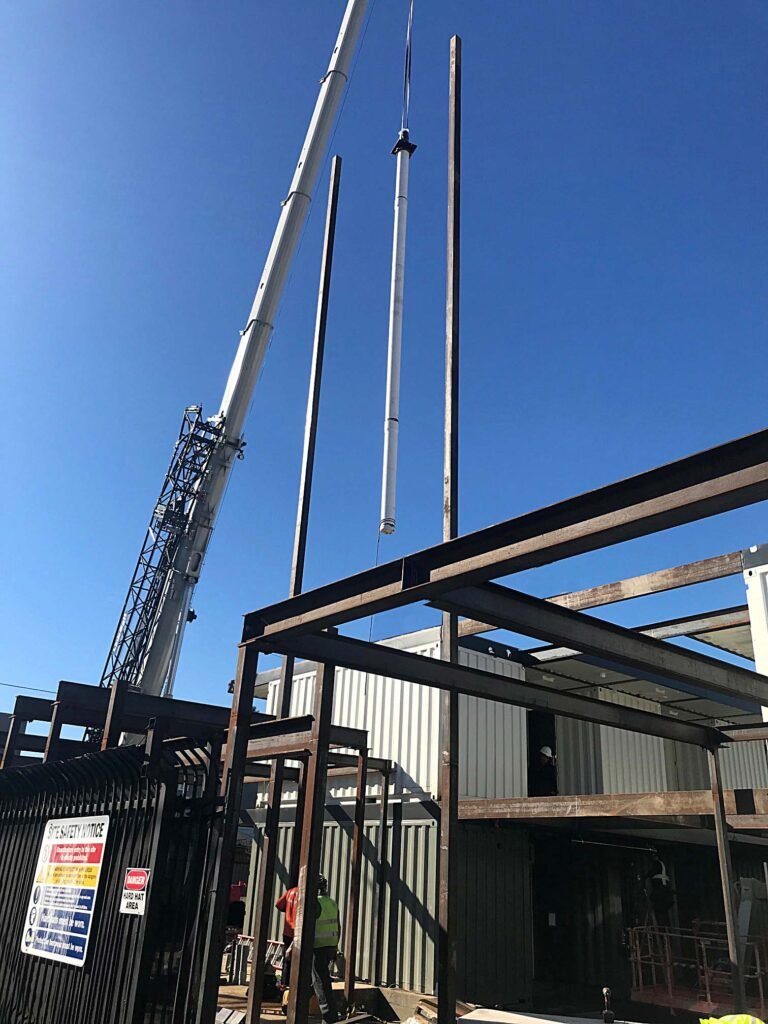

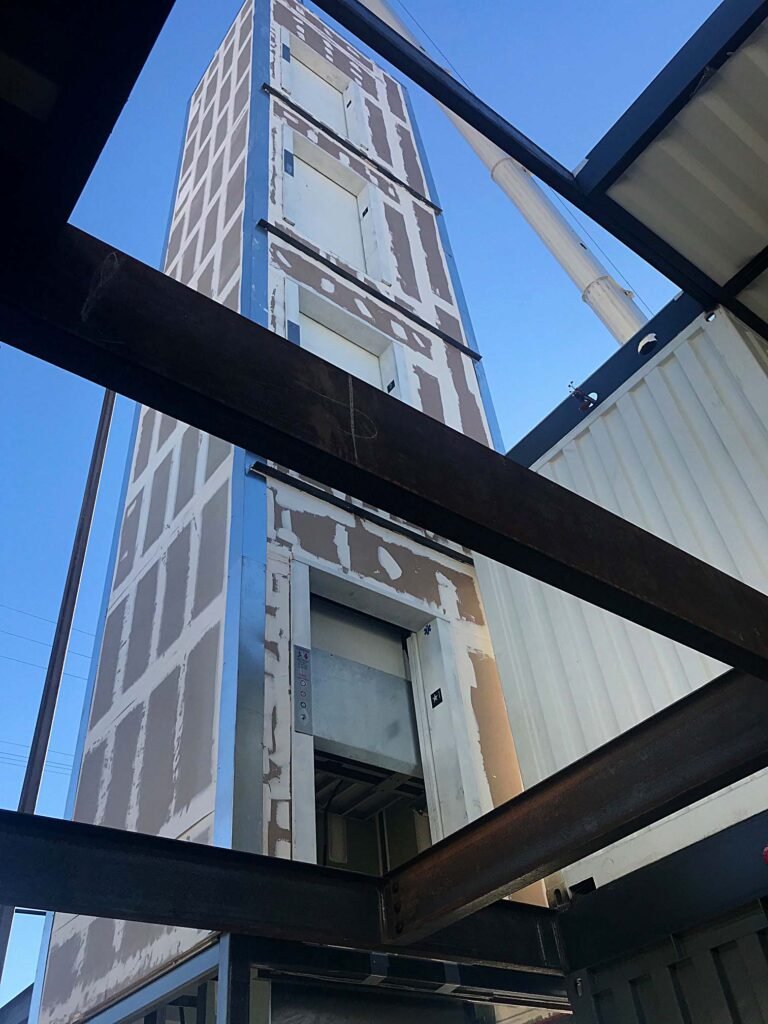
Elevator Sales Executive – Christian Lahud from TLShield & Associates explains, “In traditional construction the elevator hoistway is built and sits until power is turned on at the end of the project. Then and only then elevator technicians show up. They come and go at their leisure, carrying in elevator parts and installing them one at a time until the elevator is running.” Lahud went on to say that, “The elevator and its mechanics are the first on the site and last to leave. Everything is slowed down including other trades that need the elevator installed to finish.”
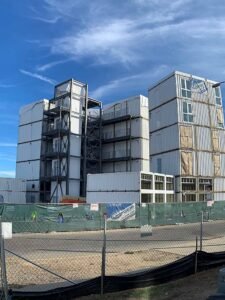
The MEM Elevator System however is produced in a factory environment where a hoistway is constructed with steel. The structure is engineered to be strong enough to be self-supporting in most cases. Then all of the elevator components are installed in the hoistway in the factory.
Ultimately, when it is needed it is loaded on to a truck, shipped to the jobsite and set in place. In four hours you will have a fully installed, commercial quality elevator ready to be started up and used. It can also double as a construction elevator.
Lahud says this makes MEM perfect for the affordable housing market. “The MEM Elevator System is high-quality, but fast in setting and startup. It is a real solution where speed is of the essence to address a pressing need. No other elevator system is shipped and in place when the customer wants it.”
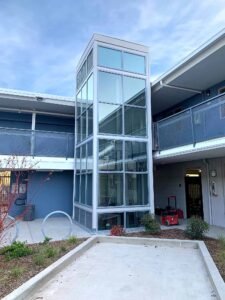
How do we know we are the solution? Over the decades of experience we have produced several elevators for supportive housing with just a couple of the most recent projects pictured. As you can see, whether a steel frame structure or modular structure involving storage containers, the MEM Elevator System is a perfect fit. We can be what you need regardless of the structure type. Right now due to the speed of modular construction and the immediacy of the problem there seems to be a high demand for modular structures. But another fast way to build housing is using an existing structure.
With that in mind, we are perfect for retrofit opportunities. The initial purpose of the modular elevators was to attach them quickly to exteriors of existing buildings to make them more accessible. We have grown from servicing just that market over the past 30 years, but we are still experts you can rely on if you have a retrofit project in mind.
Wrapping it all up the benefits are obvious:
It maybe time to explore the possibilities further regarding supportive housing elevators and see if the MEM Elevator System can meet your needs. You can click the button below for a Fast Track Quote for a project you currently are working on. However, if you want to explore it more, request a LIVE VIRTUAL TOUR. We would be happy to pull back the curtain and show you how we produce the industry’s most successful modular elevator solution.
| Thank you for Signing Up |
